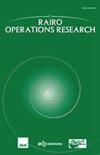Dynamical analysis and decision support system of production management
IF 1.8
4区 管理学
Q3 OPERATIONS RESEARCH & MANAGEMENT SCIENCE
引用次数: 0
Abstract
Nonlinear system dynamics and feedback control theory are presented for management optimization of supply chain system. Linearization and simplification method are widely used in analyzing system dynamics of supply chains because actual production models are highly complex and nonlinear systems. With the advanced system dynamics, it is possible directly to deal with nonlinear dynamical problems without linear approximate methods so that the decision makers can obtain more accurate results for systematic management strategies. This paper aims to propose nonlinear system theory to explore dynamical behavior and control synthesis of production-distribution system by utilizing Forrester’s model. A novel super twisting sliding mode control (SWT-SMC) algorithm has been presented based on adaptation law, ensuring management optimization against disruptions. The closed-loop system stability has been guaranteed by using Lyapunov theory. Extensive numerical simulations have been conducted to validate the efficacy and reliability of the adaptive super twisting sliding mode control (ASWT-SMC) algorithm. Four types of decision criteria have been employed to compare system performance between control strategies. With superb decision scheme powered by control algorithm, novel supply chain software can learn an ever-fluctuating production flow and anticipate the need for changes in real market.生产管理动态分析与决策支持系统
针对供应链管理优化问题,提出了非线性系统动力学和反馈控制理论。由于实际生产模型是高度复杂的非线性系统,线性化和简化方法被广泛应用于供应链系统动力学分析。有了先进的系统动力学,可以不用线性近似方法直接处理非线性动力学问题,使决策者能够获得更准确的系统管理策略结果。本文旨在利用Forrester模型,提出非线性系统理论来探讨生产-分配系统的动态行为和控制综合。提出了一种基于自适应律的超扭转滑模控制(SWT-SMC)算法,保证了系统在不受干扰的情况下进行管理优化。利用李雅普诺夫理论保证了闭环系统的稳定性。大量的数值仿真验证了自适应超扭转滑模控制(ASWT-SMC)算法的有效性和可靠性。采用了四种类型的决策准则来比较控制策略之间的系统性能。新型供应链软件通过控制算法驱动的卓越决策方案,可以学习不断变化的生产流程,并预测实际市场的变化需求。
本文章由计算机程序翻译,如有差异,请以英文原文为准。
求助全文
约1分钟内获得全文
求助全文
来源期刊

Rairo-Operations Research
管理科学-运筹学与管理科学
CiteScore
3.60
自引率
22.20%
发文量
206
审稿时长
>12 weeks
期刊介绍:
RAIRO-Operations Research is an international journal devoted to high-level pure and applied research on all aspects of operations research. All papers published in RAIRO-Operations Research are critically refereed according to international standards. Any paper will either be accepted (possibly with minor revisions) either submitted to another evaluation (after a major revision) or rejected. Every effort will be made by the Editorial Board to ensure a first answer concerning a submitted paper within three months, and a final decision in a period of time not exceeding six months.
 求助内容:
求助内容: 应助结果提醒方式:
应助结果提醒方式:


